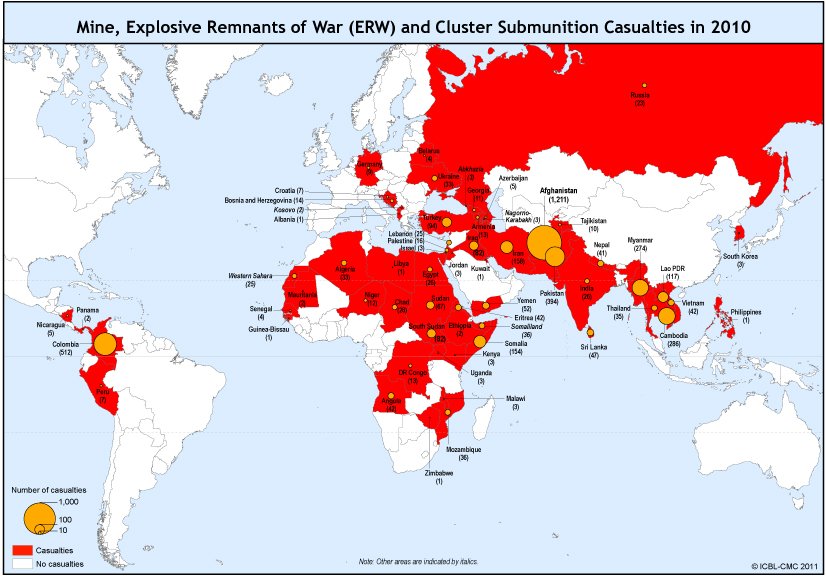Last year, landmines still killed or injured an average of four Afghans every day.
During the past four decades of war, the Mine Action Programme of Afghanistan has cleared more than 18 million explosive remnants of war, about 737,000 anti-personnel mines and over 30,000 anti-vehicle mines since 1989.
But by the end of October, the country’s first province will be declared mine-free – and the job has been done by a small but determined group of women.
“It’s been difficult,” says Fezah Rezayee, 26, a tall woman with light brown hair tucked under a red headscarf. “Not because of the work, but because of people’s attitudes towards women working outside, hiking across the province, or having male colleagues. But we kept pushing back and pointing to the importance of our work.”
Women first began landmine clearance – now a seasonal job for the spring and summer months – in Afghanistan in June last year.Earlier this spring, after the snow had melted in the Hindu Kush mountains, 18 women dressed in heavy protective gear walked into Bamyan province’s last mine fields, risking their lives to clear the remaining explosives.
Home to the famous Buddha statues destroyed by the Taliban in 2001, mine clearance started in Bamyan in 2003. Since then more than 60,000 explosives – including unexploded ordnance such as mortar bombs – have been laboriously located, unearthed and removed.
Like the rest of the team, Rezayee was born and raised in Bamyan and received a months training before stepping into the minefields.

Source: https://landminefree.org/facts-about-landmines/
“When we first advertised the positions, we had over 200 people apply,” explains team leader Habib Noor, 41, of the Danish Demining Group, the organisation currently running the project. He says he wished they had started working with female deminers earlier
Forty years of war have left Afghanistan devastated and the figures are grim: home to 37 million people, it is one of the most mined countries in the world.
“We are struggling to handle significant increases in the number of minefields in Afghanistan,” explains United Nations Mine Action Service (UNMAS) Country Director Patrick Fruchet.
He says all of the country’s 34 provinces had been mined, though no maps of their locations exist and there are no records of how many new mines continue to be put in the ground. The work has been further complicated, he says, as “authorities control only around half the country”.
The US said earlier this year that they had stopped counting how much territory the Taliban actually controlled.
October marks 18 years since the start of the US invasion in 2001. A US-Taliban peace agreement, which it was hoped would be signed this year, fell through after a bombing in Kabul that killed a US soldier caused President Donald Trump to cancel negotiations in September.
Bamyan is home to Afghanistan’s ethnic Hazara community and is a three-hour drive northwest of the capital Kabul along a road with occasional Taliban checkpoints.
Rezayee’s day – and that of her 17 female colleagues – starts before sunrise, when the women hike up into the mountains, carrying as much water and equipment as possible.
“How much ground I get to clear in a day depends on the terrain and how steep or difficult is it,” she explains, “but it’s usually anywhere between 30-40 square meters.
For this, Rezayee earns a monthly salary of 31,000 Afghani (£325), supporting both her two children and her husband.
“When I got married, I had already finished university, but my husband, who was a few years older, hadn’t even finished school,” Rezayee says. “I first opposed the marriage, telling my mother and father that I didn’t want to be with an uneducated man.
While she couldn’t counter her parents’s decision, she’s been using part of her income to help her husband catch up. “I told him he needed to go to school, and I’m now paying for his university degree,” she says proudly. “I know I’m the stronger one in my marriage and I had to push my husband, but it’s finally working.”
She gets up early to take her daughters to her mother’s house, where they stay while Razayee works. The team’s morning walks are quiet, while the women are more chatty on the hike down in the late afternoons.
“We have clear procedures,” Razayee says. “When we detect a mine, we immediately stop, raise our hand or signal to the others that we have found something. Our team leader then evaluates the situation.” Mines are either removed gently by hand or a controlled explosion is carried out on-site.
Zahra Atayee is the youngest of the team at just 21 years. “It might be a riskier job than others, but I feel confident because I know what I’m doing,” she says proudly, now sitting in her living room after a long day out and pouring tea for her father Hussain Ali, 57.
“I’m happy my daughter found a job,” he says. “She’s supporting the whole family – and actually the whole country.”
Atayee says she knows many women who are locked in their houses because that’s what their fathers and husbands demand.
“That’s why I’m proud to set an example,” she smiles. “We can do anything, even in this patriarchal society.” She plans to use her income to get a degree in economics now that Bamyan has almost been cleared of its mines.
While Bamyan remains relatively peaceful, Afghanistan has seen a surge in violence since the cancelled US-Taliban peace deal and in the lead-up to presidential elections.
“I know that anything can be possible in Afghanistan if peace will come and we can clear all the mines here,” says Atayee.
Many of the women have decided to stick with the job and are even considering moving. “We’re just finishing up here,” Atayee explains. “But there are 33 more provinces that still have landmines, and we’re ready to go.”

